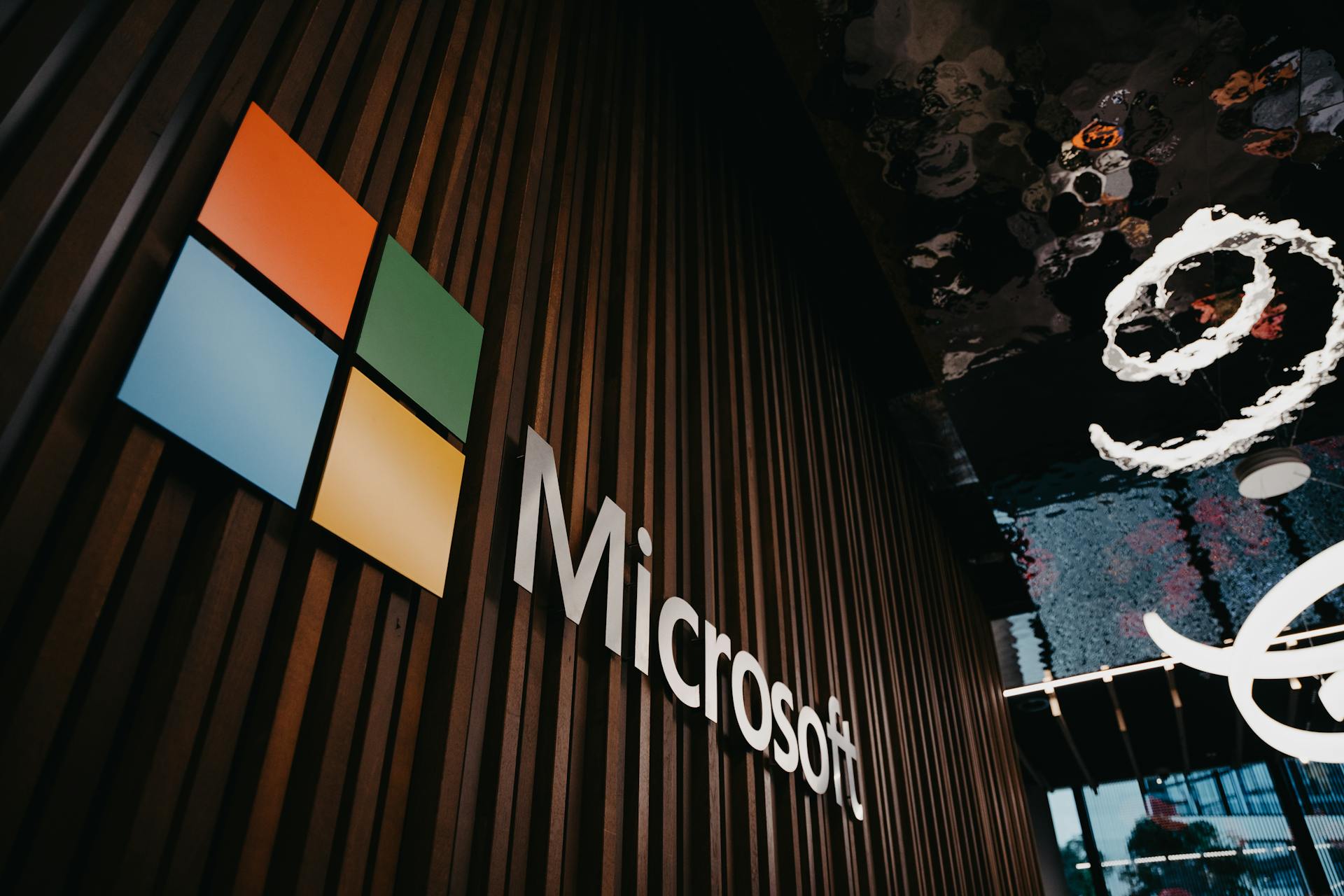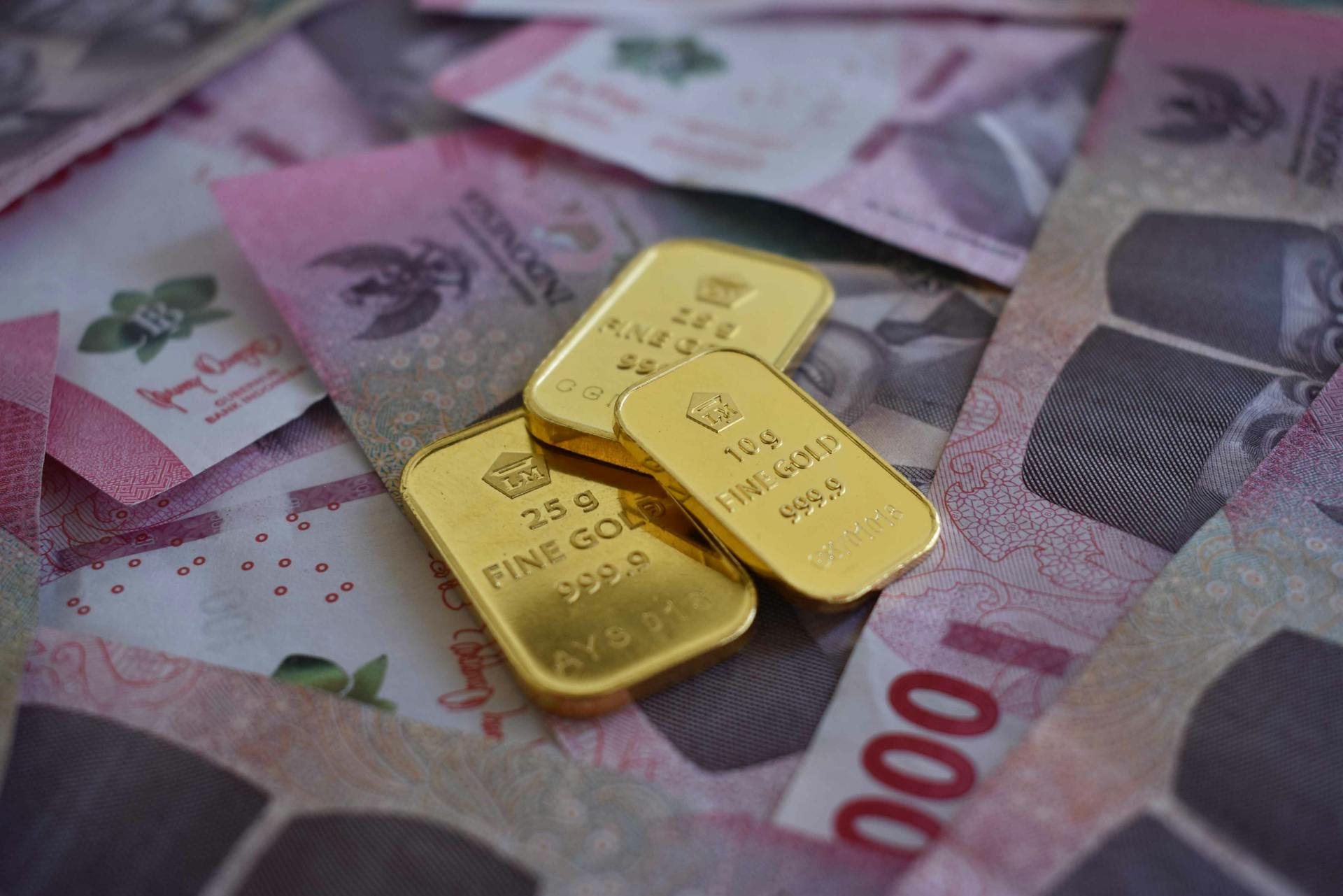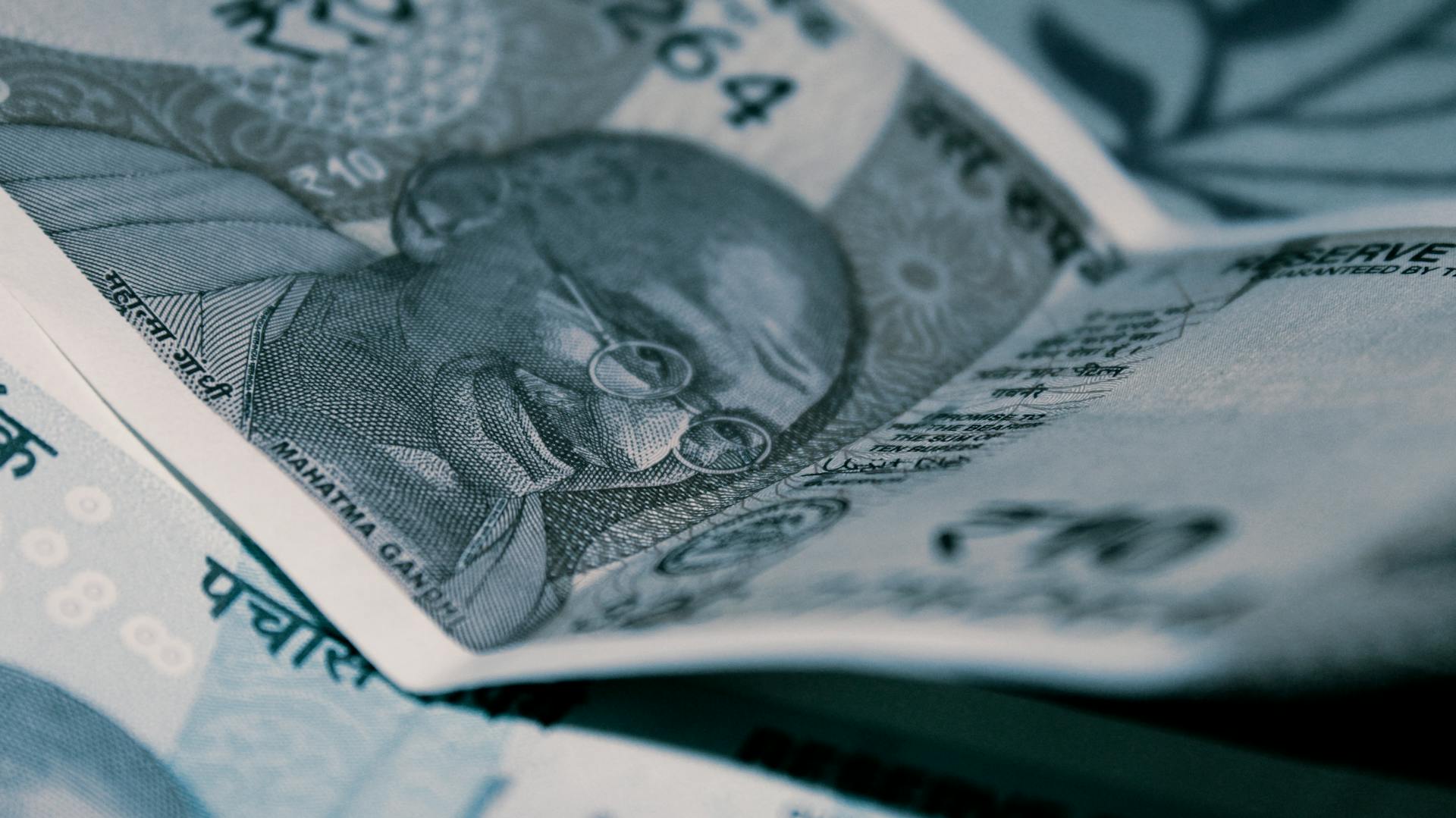
Bangkok, Thailand is a shopper's paradise, but navigating the currency exchange can be overwhelming for tourists. The official currency in Thailand is the Thai Baht (THB).
You can exchange your money at banks, currency exchange booths, or money changers in Bangkok. Be aware that the exchange rate may vary depending on the location and type of exchange.
To avoid any confusion, it's a good idea to have some local currency, Thai Baht, with you when you arrive in Bangkok. This will make it easier to pay for transportation, food, and other essentials.
Many businesses in Bangkok, including restaurants and shops, also accept credit cards, making it easier for tourists to make purchases.
Take a look at this: What Types of Money Will You Need of France
Best Ways to Exchange Currency
To exchange currency in Bangkok, you can choose from various options. You can change your money at exchange offices, which are found virtually everywhere in Thailand and offer a better exchange rate than ATMs.
Using an online alternative like Wise can also be a good option, as it offers currency exchange using live mid-market rates with no markup or margin. This can work out cheaper than most currency exchange shops in Bangkok.
Some other tips to keep in mind include comparing rates across different providers, using online currency converters or mobile apps to stay updated on current exchange rates, and considering using a travel money card.
Discover more: Changing Money in Malaysia
10 Best Places
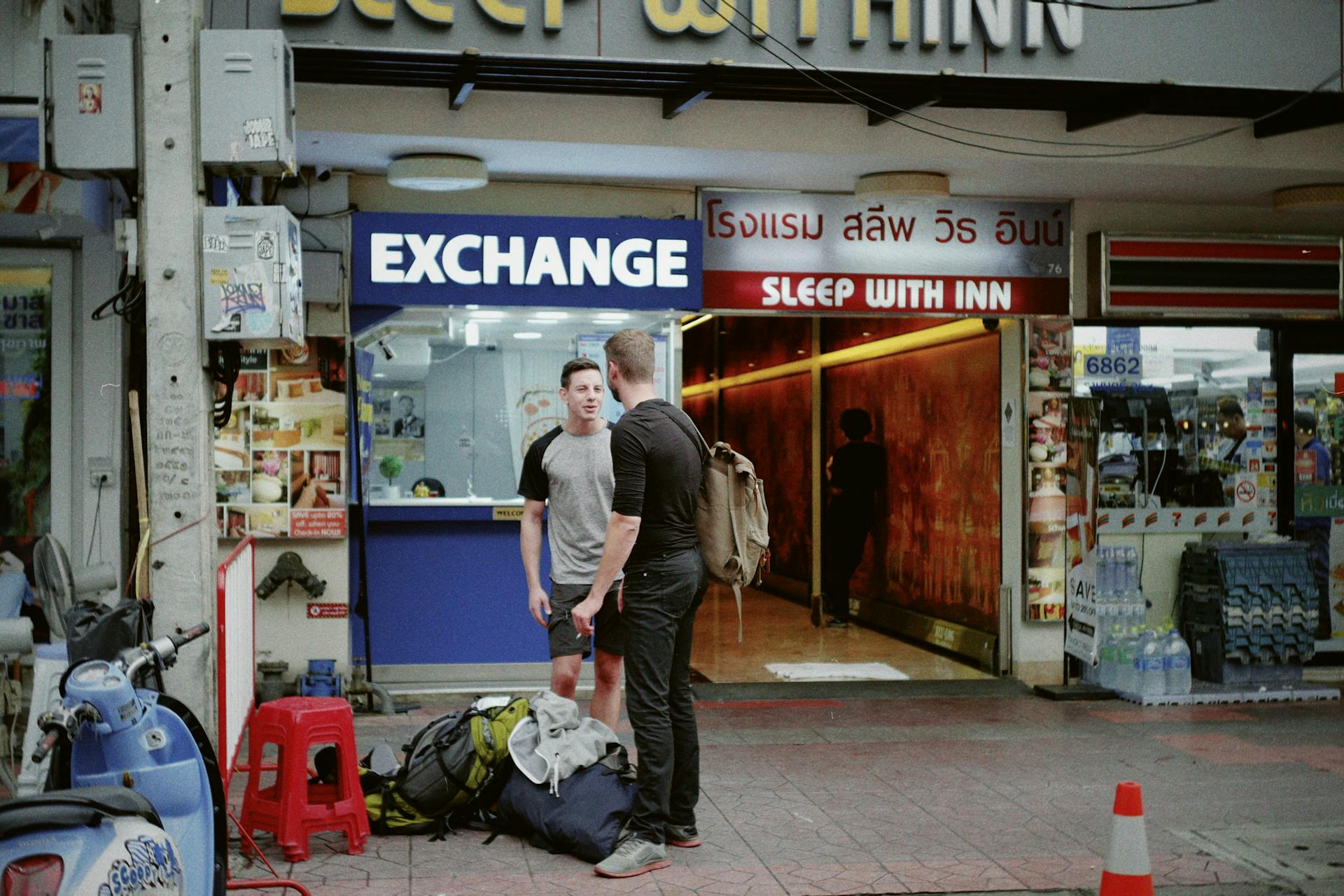
If you're looking for a reliable place to exchange currency in Bangkok, you're in luck because there are many top-rated options to choose from. In fact, there are over 10 places that have been highly rated by locals and tourists alike.
One of the best places to exchange currency in Bangkok is Superrich Thailand, which has a 4.1 out of 5-star rating on Google. You can find them at 45 ซอย ราชดำริ1 Khwaeng Lumphini, Pathum Wan.
Another great option is SuperRich Exchange Ratchadamri, which has a whopping 4.8 out of 5-star rating on Google. Their address is 67,69, 71 Soi Ratchadamri 2, Khwaeng Lumphini, Pathum Wan.
If you're in the Sukhumvit area, Vasu Exchange is a good choice, with a 4.5 out of 5-star rating on Google. You can find them at PHR4+765, Sukhumvit Rd, Khwaeng Khlong Toei Nuea, Watthana.
Here are the top 10 places to exchange currency in Bangkok, according to Google ratings:
Finding the Best Rates
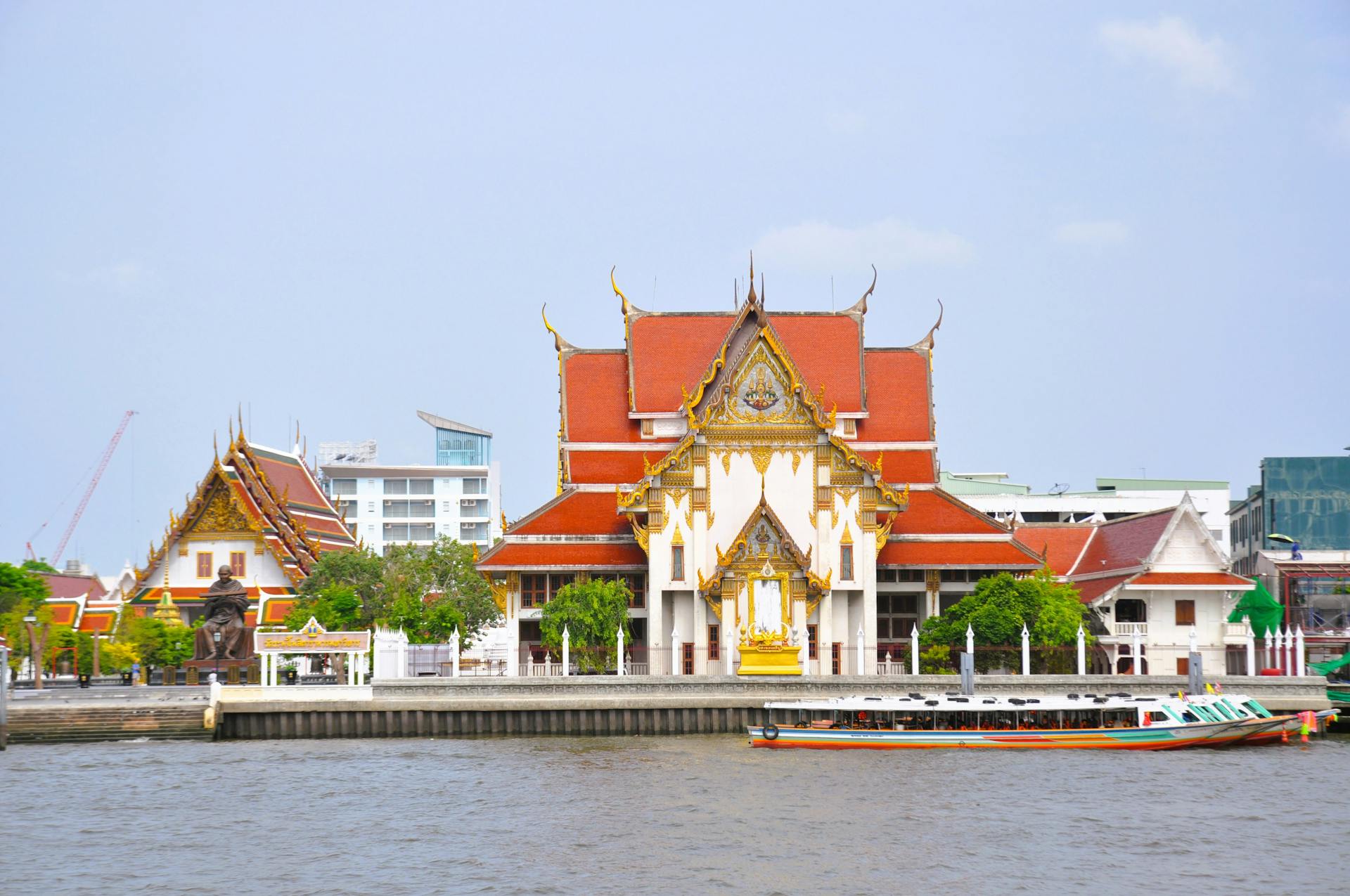
To find the best currency exchange rates in Bangkok, it's essential to understand the mid-market exchange rate for your currency pair. This rate is the benchmark to measure up your options, and you can find it on Google.
The mid-market rate is the rate used when trading on global markets, but providers often add a percentage markup or margin to the rate offered to retail customers. To get the best rate, look for a provider that offers this or as close as possible to it.
Compare the available rates across different providers close to you and online, and be sure to check for any additional fees or commissions that can push up costs significantly.
You can also use online currency converters or mobile apps to stay updated on the current exchange rates for your currency pair and buy when the time's right.
Some popular exchange services in Bangkok include Superrich Thailand, SuperRich Exchange Ratchadamri, and Vasu Exchange, with Google ratings ranging from 4.1 to 4.8 out of 5 stars.
Related reading: Which Is Traded in a Currency Exchange Market
Here are some of the top-rated exchange services in Bangkok, according to Google:
Using a travel money card from a service like Wise can also be a good option, as it offers currency exchange using live mid-market rates with no markup or margin.
Here's an interesting read: Free Travel Credit Cards
Exchanging Currency at Airports
You can change your money at exchange offices virtually everywhere in Thailand, but the best ones are found on the basement level of Bangkok's international airport, near the orange Superrich Exchange office.
The Superrich Exchange Office at the basement of Suvarnabhumi Bangkok Airport is a great place to exchange your money, as it offers a favorable exchange rate.
You can exchange your money for Thai Baht after arriving in Thailand, and the exchange rate is always better than what you'd get before your trip.
It's a good idea to bring enough local money only for the cost of your first day before your trip to Thailand, and then exchange the rest of your money after arriving.
Exchanging money at the airport can save you from the hassle of finding a money exchange office elsewhere in the city.
Broaden your view: Post Office Currency Conversion
Using Cards and ATMs
You can use cards in Thailand with a 1% commission being charged. Most tourist attractions, large hotels, and some chain shops can accept debit cards and credit cards.
Visa and MasterCard are the most common credit cards that can be accepted in Thailand. However, some small restaurants and stalls can accept cash only.
To withdraw cash, you can use an ATM with your debit or credit card. ATMs are everywhere in Thailand, including at the airport, banks, department stores, and supermarkets.
You'll pay a transaction fee for every withdrawal, usually around 300 baht per transaction. Some banks also charge extra fees for every withdrawal.
It's generally cheaper to withdraw cash with a debit card than with a credit card. According to the Dutch Consumer Association, the difference in fees for withdrawing €500 with a debit card or a credit card is €30.
To get the best exchange rate, choose to be charged in THB when paying with plastic. This will save you some money, although you may be charged a small transaction fee.
For your interest: Credit Cards Accepted in Europe

Here are some tips for using ATMs in Thailand:
- ATMs first give you the money, then your card.
- Make sure you activate your card so that you can withdraw money outside of Europe.
- Always choose the option “Without Conversion”, and not “With Conversion” when withdrawing money in Thailand.
- ATMs almost always give out 1,000 baht notes, which can be difficult to break up. Try and buy something small from the 7-Eleven to break up the note.
Understanding Thai Baht Currency
Thai Baht is the most convenient currency to use in Thailand, widely accepted throughout the country.
You can purchase or exchange Thai Baht before your trip to Thailand, either in banks, post offices, or other foreign exchange businesses.
It's recommended to bring only enough local money for the cost of your first day in Thailand, as the exchange rate is always better in Thailand.
Thai Baht Currency
You can get Thai Baht by exchanging your local money in banks, post offices, or other foreign exchange businesses before or after arriving in Thailand.
Thai Baht is the most convenient currency to use in Thailand, widely accepted throughout the country.
You can exchange your money for Thai Baht in Thailand and get a better exchange rate than exchanging it beforehand.
It's recommended to bring enough local money only for the first day of your trip to Thailand, and then exchange it for Thai Baht when you arrive.
US Dollars can be used in certain circumstances, such as in tourist areas, larger hotels, and airports, but it's not recommended due to the potential for a poor exchange rate.
Check this out: Exchanging Currency in India
Historical Symbols Used Before Decimalization
Before decimalization, the Thai government used a variety of scripts on their banknotes and coins. These scripts included Chinese, Latin, Jawi, Devanagari, Khmer, Khom, Lanna, and Burmese.
The use of multiple scripts was likely to facilitate trade within Siam, as Bangkok was a multicultural city at the time. This made it easier for people from different cultural backgrounds to understand and use the currency.
The character 圓; yuán was used to represent baht during the times of Rama IV, but it was phased out in favor of another character. This character is still partially and informally used today.
The character 銖; zhū was officially used on banknotes from 1868 to 1925 to represent baht, and it's still used today unofficially to refer to the Thai baht in general. You might see it written as 泰銖 or 泰铢.
The character 錢; 銭; qián was used to represent salueng from 1851 to 1908 on banknotes and coins. This is the character you'll see when referring to the smaller unit of currency.
The character 方; fāng was used to represent fueang from 1851 to 1908 on banknotes and coins.
Symbol
The Thai baht's currency symbol is ฿, a unique character that's a combination of a Latin letter B with a vertical stroke.
This symbol has a specific codepoint for computer use, which was first established in the Thai Industrial Standard 620-2533 in 1986.
The Thai currency symbol ฿ is also used for the Panamanian balboa, highlighting the versatility of this character.
In terms of technical standards, the ISO/IEC 8859-11 standard, also known as ISO Latin-Thai, was developed to include this symbol.
The Unicode standard, which is a global standard for character encoding, allocated the codepoint U+0E3F to the Thai currency symbol ฿, making it a widely accepted character globally.
A different take: Viking Cruises Stock Symbol
What Is in
The Thai Baht is the official currency of Thailand, divided into 100 satangs.
Thai Baht banknotes come in denominations of 20, 50, 100, 500, and 1000 baht.
You can exchange your money for Thai Baht at airports, banks, and currency exchange offices, but be prepared for varying exchange rates.
The Thai government also issues coins in denominations of 1, 2, 5, and 10 baht, as well as 25 and 50 satang coins.
Suggestion: 100 Usd to Bali Currency
Siam
If you're looking to exchange currency in Bangkok, there's a convenient option called Siam Exchange. You can find it at 422/3 Phaya Thai Rd, Khwaeng Wang Mai, Pathum Wan, Krung Thep Maha Nakhon 10330, Thailand.
Siam Exchange is open from 9:30 AM to 6:00 PM on weekdays, and 9:30 AM to 4:00 PM on Saturdays. It's closed on Sundays.
If you're planning to exchange currency on a weekday, you can visit Siam Exchange from 10:00 AM to 7:00 PM. On Saturdays, it's open from 10:00 AM to 7:00 PM, and on Sundays, it's open from 10:00 AM to 7:00 PM.
You can contact Siam Exchange by phone at +66 2 216 4782 or visit their website at http://www.siamexchange.co.th/.
Related reading: Amex Centurion Lounge Us Open
Featured Images: pexels.com
